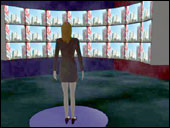


Italian version
.art

26.02.03 Dutch Electronic Art Festival 03: Data Knitting.
On February 25 opens the 2003 edition of the Dutch Electronic Art Festival, this time named 'Data Knitting'. Organized as always by the V2_Organisation, this edition features many more works than the previous ones. Starting from 'Code Zebra', which is the artists collective who has organized an interaction formula made of voluntary coercion: shutting up an artist and a scientist in the same room for 24 hours and making them talk about the themes the festival deals with. All that happens in this 'Habituation Cage', on the last floor of the venue, will be streamed on the Net and shown in the halls. Visitors, too, can contribute to the discussion, again through the Net, while among the participants there will be Mary Flanagan and Paul Wong.The exhibition of these works is focused on the databases responsible for the information overflow and for the potential access to knowledge. The role of the database in the strict sense can be found in 'They Rule', Josh On's much praised database of power, 'Pocket Full of memories' by George Legrady, which asks every visitor to scan one of their own objects and assembles a collective database which can then be manipulated by the visitors themselves. The play aspects, too, always difficult to categorize, are covered by 'Can You See Me Now?', an Internet project by Blast Theory who, for five days, will play online and on the roads of Rotterdam to something like a thief chase, and by 'PainStation' by Tilman Reiff and Volker Morawe, a Pong-like game which gives electric shocks to the loser, inspired by the Emilio Largo vs. James Bond 'Domination' match in 'Never Say Never'. There's also 'Globe Jungle', by Yasuhiro Suzuki, which films the children playing with its globular wireframe structure during the day and shows the images inside itself at night, suspended between memory and illusion. On the visual front there's 'Exactitudes', the photographic project by Ari Versluis and Ellie Uyttenbroek, who have been trying for years to photograph subjects belonging to the same urban subcultures, and exhibit these pictures comparatively on the theme 'Gameboys'. Following this same guideline is the urban environment mixed by Geert Mul in his '100,000 Streets', where the architectures of Tokyo, Rotterdam and New York are mixed and layered on top of one another creating a both plausible and unreal cityscape. New sound perspectives can be experienced in 'Phonic Frequencies', by Tamás Szakál, where the users can modify the projections in some rooms using a telephone interface, while 'Nybble-Engine-Toolz', by Margarete Jahrmann and Max Moswitzer, is an experiment where peer-to-peer servers convert the data on their hard disks (text, images and sounds) to abstract moving pictures which are then shown on a 180 degrees screen. Anthropomorphic agents made alive by data are those of AgentRuby and Synthia, and anthropomorphic, too, is Poetry Machine 1.5, an installation where a self-moving keyboard appears to generate the phrases projected on the walls and read by a synthesized voice. By stopping the mechanism, the visitors can type in their phrases, whose words will be searched on the Net to find fitting associations. Finally there's the sarcastic 'Police State', by Jonah Brucker-Cohen, which interfaces the Carnivore software to a toy police cars patrol. The dense schedule will be closed by the 'Information is Alive' symposium, with Manuel De Landa and Sadie Plant and the seminar 'Copy the Rights!', with Jon Ippolito and Andy Powell.